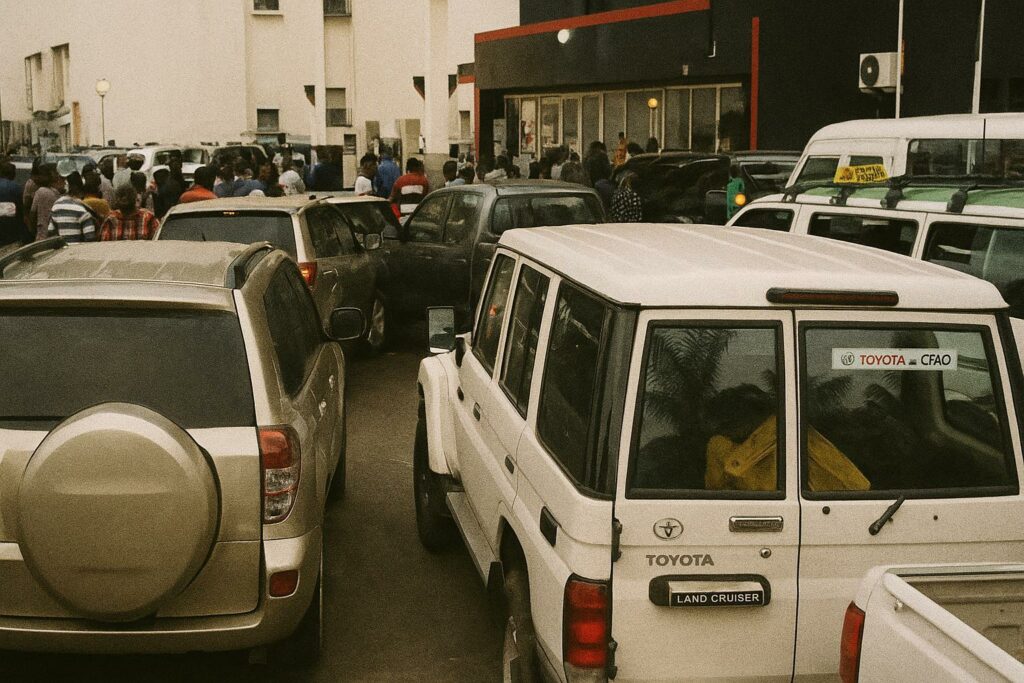A Chronic Shortage with Deep Roots
The image of kilometre-long queues at petrol stations in Brazzaville has become a recurring tableau, belying the paradox of a country that exports crude but struggles to fill domestic tanks. Hydrocarbons Minister Bruno Jean Richard Itoua, addressing senators in early May, admitted that the problem is “structural” and can no longer be treated as a passing inconvenience. His assessment converges with observations in the IMF’s latest Article IV report, which notes that a legacy of under-investment, opaque subsidies and debt overhang has left the downstream segment ill-equipped to cope with demand spikes (IMF 2024).
Infrastructure Bottlenecks from Jetty to Petrol Pump
The Republic of Congo’s storage capacity hovers around 20 days of national consumption, far below the 90-day strategic buffer recommended by the International Energy Agency. The Société Commune de Logistique (SCLOG), majority-owned by traders Trafigura and the national oil company SNPC, was conceived to bridge that gap, yet its 180 000-m³ terminal in Pointe-Noire has not kept pace with population growth and rising motorisation. Rail and river barges that once moved refined products into the hinterland now operate at barely half of their nominal capacity because of ageing rolling stock and recurrent silting on the Oubangui River (African Development Bank 2023). The outcome is a distribution network so brittle that a single delayed cargo, such as the one reported by Reuters on 12 March 2024, can paralyse the economy for days.
Pricing Orthodoxy Meets Social Reality
Minister Itoua, echoing IMF advice, proposes a phased liberalisation of pump prices and the termination of the state’s sole import monopoly. Yet the political cost of subsidy removal looms large. Petrol at 695 CFA francs per litre already devours nearly a fifth of the monthly income of an urban minibus driver, according to a survey by the Congolese Observatory of Economic Indicators. In 2022, an abrupt price hike in neighbouring Chad triggered protests that left dozens dead; Brazzaville’s leadership, still wary of post-election tensions, is keen to avoid a similar scenario. As a result, what Itoua calls “coercive short-term measures”—temporary quota systems and emergency imports—continue to dominate policy, buying time but eroding fiscal space.
The IMF’s Prescription and Domestic Political Calculus
Behind closed doors, Fund negotiators have urged Congo to dismantle the preferential import channel reserved for the Société Nationale des Pétroles du Congo and to spin off the ailing Congolaise de Raffinage (CORAF). Built in 1974 and rehabilitated with Chinese credits in 2013, CORAF operates at barely 45 percent of its 1 million-tonne annual capacity, a performance deficit attributed to feedstock mismatch and maintenance lapses (Bloomberg 2023). While the technocratic case for reform is compelling, unions fear job losses and the presidency fears surrendering control over a strategic sector that underwrites political patronage.
Regional Reverberations and Security Externalities
The dysfunction of Congo’s fuel chain is not a parochial matter. Land-locked neighbours—Central African Republic and parts of western DR Congo—depend on SCLOG’s depots for part of their supply. A prolonged disruption in Pointe-Noire therefore reverberates along regional trade corridors, inflating food prices and constraining humanitarian operations run by UN agencies. Furthermore, illicit artisanal refineries on the Congo River delta, already blamed for environmental damage, find fertile ground when legal product disappears from the formal market, diverting fiscal revenues and complicating maritime security in the Gulf of Guinea (ISS 2023).
Charting a Path: Strategic Stockpiles and Financial Engineering
In the short run, Brazzaville has chartered additional cargoes from trading houses Vitol and Sonangol, while SCLOG is negotiating bridging finance with Afreximbank to expand tankage by 120 000 m³. Officials also tout a memorandum with Chinese consortium Poly Grupo to construct a 1 000-km products pipeline linking Pointe-Noire to Ouesso, though previous pipeline projects, such as the aborted 2008 Total scheme, offer cautionary tales about governance slippage. Beyond brick-and-mortar solutions, experts argue for hedging instruments to buffer price volatility and the drafting of a public finance law ring-fencing part of oil revenues for strategic stocks, akin to Ghana’s Petroleum Funds model.
A Narrowing Window for Credible Reform
President Denis Sassou-Nguesso’s administration faces a narrowing window before the 2026 electoral cycle. Implementing transparent tenders, opening the import market and clarifying the role of CORAF could attract investment and reassure lenders, yet each decision upsets entrenched interests. As one senior EU diplomat in Brazzaville put it, “The chemistry of reform is easy on paper; the politics is combustible.” Whether Minister Itoua can translate his Senate candour into actionable policy will determine if the next dry spell is a logistical incident or a systemic rupture with broader security ramifications.

